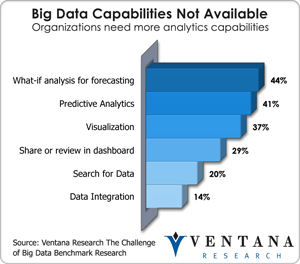One of the most important IT trends over the past decade has been the proliferation of ever wider and deeper sets of information sources that businesses use to collect, track and analyze data. While structured numerical data remains the most common category, organizations are also learning to exploit semistructured data (text, for example) as well as more complex data types such as voice and image files. They use these analytics increasingly in every aspect of their business – to assess financial performance, process quality, operational status, risk and even governance and compliance. Properly applied, business analytics can deliver significant value by deepening insight, supporting better decision-making and providing alerts when situations require attention from managers or executives.
Packaged analytic applications and specialized tools continue to expand in number and improve in functionality in response to specific needs. Businesses now have access to tools for creating tailored applications for vertical industries, which means analytics use is no longer limited to trained statisticians. Techniques for processing large data sets (big data) have proliferated to the point where employing insights from them for practical business purposes is now within reach, even for midsize companies. This includes the use of predictive analytics to enable earlier and more intelligent responses to changing business conditions. Web-based platforms for handling huge sets of data make it possible for companies to access and utilize these advanced analytics economically. Advances in mobile technology provide simpler access to analytics from smartphones and tablets and facilitate collaboration.
Analytics has long been a tool used by finance. Because accounting records are numerical and readily available, people in the finance function have been able to use forms of analytics for centuries. As a result, analytical techniques for assessing balance sheets, income statements and cash flow statements are well-developed and widely accepted. Unfortunately, because these techniques are so well-established, finance professionals have been slow to broaden their palette of analytics even as the opportunities available to them have proliferated. Our research shows that many organizations lag in their use of advanced finance analytics. Many of them view the role of finance analytics narrowly; as a whole, finance has largely failed to take advantage of advanced analytics to address the broader needs of today’s enterprises and thus increase its own value. Indeed, too few professionals even realize that these tools can help finance take more of a leadership role in their corporation.
Forward-looking finance departments can start to use cutting-edge analytic initiatives in areas that include customer profitability, price and profitability optimization, lean manufacturing, risk mitigation and economic costing methods, but their use requires an in-depth understanding of the options available and the information technology requirements for each. Those insights alone, though, will not make a difference; few finance organizations have done the evaluations necessary for selecting the right analytic methods and tools and using them properly. For example, our research in big data shows that fewer than half of organizations are using big data for activities that should be staples of finance organizations, such as contingency (“what if”) planning and predictive analytics.
and economic costing methods, but their use requires an in-depth understanding of the options available and the information technology requirements for each. Those insights alone, though, will not make a difference; few finance organizations have done the evaluations necessary for selecting the right analytic methods and tools and using them properly. For example, our research in big data shows that fewer than half of organizations are using big data for activities that should be staples of finance organizations, such as contingency (“what if”) planning and predictive analytics.
I find that prospective buyers’ poor understanding of analytics-based best practices and functional requirements are significant issues in most companies, as are deficiencies in their software and data environments. All these hinder their ability to improve their control over business processes and make it more difficult to choose new technology that can deliver value.
Our research shows that finance organizations typically trail other lines of business in adopting technology. Today, advances such as in-memory processing, big data, predictive analytics and visual discovery offer the potential to revolutionize finance analytics. Finance organizations need to understand how to use advanced analytics to achieve better performance. Analytics also must be accessible anywhere and at any time to foster collaboration and promote agility – two management ingredients that can drive superior performance. Many analytics-related processes (such as planning and reviewing) are collaborative as well as iterative. Mobile analytic capabilities (provided by smartphones and tablets) that enable quick access and instant communication across an organization are not shiny new toys. They are important components to an IT infrastructure that supports better processes.
Regards,
Robert Kugel – SVP Research












